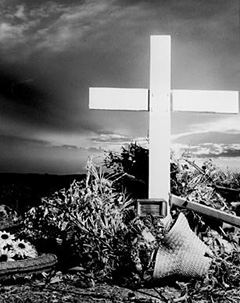 |
 |
 |
 Editorials | Issues | November 2006 Editorials | Issues | November 2006  
Political Drift Fuels Drug War
 Alberto Cabezas - El Universal Alberto Cabezas - El Universal


| | This is the grave of Esequiel Hernandez, another innocent victim of the drug war. |
The drug-related mayhem that has claimed more than 2,500 lives in Mexico since the beginning of 2005 is at least partly the result of political drift under outgoing President Vicente Fox, a veteran crime reporter says.

"The political chaos, the lack of political accord strikes directly at the most sensitive part of the country, which is security," maintains Ricardo Ravelo, a correspondent for Proceso magazine and author of a just-published book on attorneys who specialize in defending accused drug lords.

He told EFE in an interview that the Fox administration´s claim that it is winning the fight against the country´s drug cartels "is just talk."

"The Fox government is ending as it began, with promises and speeches, but there is a split between what it says and what it does," added Ravelo, a 40-year- old native of Veracruz.

Fox, who is due to hand over power to fellow conservative Felipe Calderón on Dec. 1, has presided over the deaths and apprehensions of a number of high-profile drug traffickers. But those actions seem to have done nothing to reduce the flow of banned substances and have been accompanied by an explosion of internecine warfare in the Mexican underworld.

Ravelo said the country is in disarray stemming from Fox´s victory in the 2000 election over the Institutional Revolutionary Party (PRI), which had ruled without interruption since 1929.

"There is still no absolute presidential power that provides certainty about drug trafficking and keeps crime under control," Ravelo said.

"The transition phase is coming, but without any real political controls. Nobody is agreeing on anything and this (environment) is drug trafficking´s great breeding ground," he said.

In his recent book "Narcoabogados" (narco-lawyers), he tells the stories - from the human perspective - of six attorneys who represent reputed kingpins.

One of those profiled is 52-year-old Raquenel Villanueva, the woman who is probably Mexico´s most famous attorney.

Ravelo admits that the "narco-lawyers" are fascinating people, adding that several of them got into their positions "through a stroke of fate, not through a conscious decision," and others got involved "for pleasure," to experience risk or for money.

The reporter, who is also the author of the 2005 book "Los Capos" (the chiefs), an X-ray view of Mexican drug trafficking, believes that the current violence arose largely due to the lack of someone who could "set guidelines ... (and) impose order" among the seven cartels currently operating in the country. That task had been performed in the past by the now-defunct DFS secret police.

"So (the drug traffickers) have to find a leader among themselves. And they are looking in the way they do best, through violence. That´s where the chaos comes from," he said.

One of the symptoms of the deterioration of public order can be seen within the police, which is infiltrated and corrupted by drug trafficking and is not presently acting against the cartels but rather "in complicity" with them.

"It seems that the violence has moved into the police nucleus. The police are playing an important role in this battle not as combatants, but rather as an extension" of the cartels, Ravelo said.

In writing his recent book, the journalist got to know the reality of drug trafficking in Colombia from close up by interviewing Gustavo Salaza, the man who was the defense attorney of the late drug lord Pablo Escobar.

Ravelo said that "right now, Mexico is repeating, in large measure, the same mistakes and is moving close to the chaos Colombia experienced, but there are still very important differences ... I don´t doubt that this, very soon, if it is not controlled, could equal what Colombia went through."

That country saw the disappearance of the violent Medellín and Cali cartels, but it continues to be "the great provider of drugs to the United States via Mexico."

"Now, there are dozens of small organizations ... Drug trafficking is spread out. They are no longer large criminal organizations," he said. | 
 | |
 |



